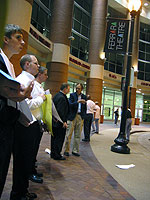How to Make a Knot/Cord Rosary
While growing up, I've tried a variety of craft projects, and one of my favorites has always been making knot Rosaries. I find making knot Rosaries to be very condusive to silent prayer and reflection, and you can do many great things with the Rosaries you make.
Knot Rosaries are very durable (when made properly), they feel great while praying the Rosary, the Divine Mercy Chaplet or other devotional prayers on them, and they look very nice. So far, none of the Rosaries I've made and given away or sold have had any problems falling apart, even after a few years of use! As an additional benefit, they are not very hard to make, and the supplies you will need do not cost very much at all!
 On Friday, October 8, 2004, members of the Kenrick-Glennon Seminary community traveled to the America’s Center to witness to the Pro-Life cause. Wearing sweatshirts that proclaimed ‘Dedicated to the defense of all human life,’ the seminarians attempted to attend the Democratic Watch Party and Rally (at which John Kerry would later be present) and pray for the senator to stand for what he believes as a Catholic.
On Friday, October 8, 2004, members of the Kenrick-Glennon Seminary community traveled to the America’s Center to witness to the Pro-Life cause. Wearing sweatshirts that proclaimed ‘Dedicated to the defense of all human life,’ the seminarians attempted to attend the Democratic Watch Party and Rally (at which John Kerry would later be present) and pray for the senator to stand for what he believes as a Catholic.